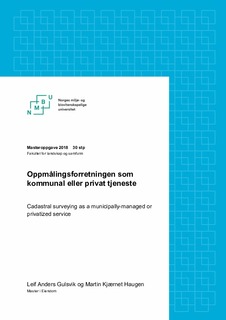| dc.contributor.advisor | Hegstad, Einar | |
| dc.contributor.advisor | Gammelmo, Leikny | |
| dc.contributor.author | Gulsvik, Leif Anders | |
| dc.contributor.author | Haugen, Martin Kjærnet | |
| dc.coverage.spatial | Norway | nb_NO |
| dc.date.accessioned | 2018-10-25T11:11:45Z | |
| dc.date.available | 2018-10-25T11:11:45Z | |
| dc.date.issued | 2018 | |
| dc.identifier.uri | http://hdl.handle.net/11250/2569559 | |
| dc.description.abstract | Temaet for oppgaven er oppmålingsforretningen som kommunal eller privat tjeneste. Våren 2015 ble det foreslått av representanter på Stortinget å utrede organiseringen av eiendomsoppmålingen. Det ble foreslått å oppheve det kommunale monopolet, og åpne opp for fritt landmålervalg. Videre ble det foreslått å sentralisere matrikkelføringen. Dette førte til en lovendringsprosess for matrikkelloven.
For å undersøke oppgavens tema har vi valgt problemstillingen: Å belyse mulige konsekvenser ved innføring av fritt landmålervalg. Åtte teser er laget for å svare på problemstillingen. Tese 1: Ved en privatisering vil verdifull eiendomskompetanse kunne forsvinne fra kommunene. Tese 2: Privatisering av eiendomslandmålingen kan føre til kortere ventetid. Tese 3: Privatisering vil ikke føre til at tjenesten blir billigere for kunden. Tese 4: Private landmålere engasjert av søker, kan bli oppfattet som mindre nøytral enn kommunen av andre som blir berørt av en oppmålingsforretning. Tese 5: Matrikkelloven § 7 er et godt virkemiddel for å heve kvaliteten på matrikkelen, og privatisering vil kunne bidra til økt kapasitet for å få gjennomført ikraftsetting av lovbestemmelsen. Tese 6: Privatisering vil kunne gi kunden en nyttig konsulent gjennom hele prosessen. Tese 7: Sentralisert matrikkelføring kan gi en mer ensartet og raskere føring, og dette kan føre til en kvalitetsheving av matrikkelen. Tese 8: Nye kompetansekrav til eiendomslandmålerne vil føre til kvalitetsheving av matrikkelen.
Oppgaven har et teori- og bakgrunns kapittel som gjør rede for matrikkelloven og lovendringsprosessen. Videre presenteres innsamlet empiri fra intervjuer. Informasjonen fra intervjuene danner grunnlaget for drøftelsen. Funnene viser blant annet at det ikke er nærliggende å tro at ventetiden vil endre seg ved privatisering. Prisen kan endre seg, men det vil ha størst utslag for store utbyggere. Private eiendomslandmålere kan bli oppfattet som mindre nøytrale enn kommunen, men en autorisasjonsordning vil minske risikoen. Matrikkelloven § 7 vil heve kvaliteten på matrikkelen, men samfunnskostnadene kan bli høye. Mye tyder på at sentralisert matrikkelføring vil føre til en mer ensartet og raskere føring. | nb_NO |
| dc.description.abstract | The focus of this thesis is to determine whether the cadastral surveying profession should stay a municipally-managed service or become a privatized one. In the spring of 2015, representatives from Stortinget called for an assessment of cadastral surveying. Specifically, a proposal was introduced to abolish the municipal monopoly on the service. Furthermore, the proposal suggested centralizing cadastral recording. This has sparked a legislative process working to change the Cadastre Act. In seeking to investigate this case, we have chosen the research topic: Interpreting the potential consequences of introducing cadastral surveying to a free market. Using the following eight theorems, we will explore it further.
Theorem 1: With privatization, valuable land rights expertise could disappear from municipalities. Theorem 2: The privatization of cadastral surveying could lead to shorter processing times. Theorem 3: Privatization will not cause surveying services to become cheaper for the applicant. Theorem 4: Private surveyors hired by the applicant could be perceived as less neutral than the municipality would be by others affected by a survey. Theorem 5: Section 7 of the Cadastre Act is a good tool for raising the quality of the cadastre. By privatizing cadastral surveying, the market capacity has the potential to increase in a way that makes it safe to implement the legislation. Theorem 6: Privatization could provide the applicant with an advantageous consultant throughout the process. Theorem 7: Centralized cadastral registration could provide a quicker and more uniform registration process, which could lead to an enhancement in quality of the cadastre. Theorem 8: Introducing new qualification requirements for cadastral surveyors could lead to an enhancement of the quality of the cadastre.
The thesis includes empirical findings, theory, and background chapters, which explain the Cadastre Act and the legislative process. Using information collected from the interviews, the main findings of the thesis will show: it is not likely to think that processing times will change via privatization. The price may change, but the impact will be felt most by property developers. Private cadastre surveyors could be perceived as less neutral than their municipal counterparts, but an authorization scheme could reduce the risk. | nb_NO |
| dc.language.iso | nob | nb_NO |
| dc.publisher | Norwegian University of Life Sciences, Ås | nb_NO |
| dc.rights | Attribution-NonCommercial-NoDerivatives 4.0 Internasjonal | * |
| dc.rights.uri | http://creativecommons.org/licenses/by-nc-nd/4.0/deed.no | * |
| dc.subject | Matrikkelloven | nb_NO |
| dc.subject | Matrikkelen | nb_NO |
| dc.subject | Landmåling | nb_NO |
| dc.title | Oppmålingsforretningen som kommunal eller privat tjeneste | nb_NO |
| dc.title.alternative | Cadastral surveying as a municipally-managed or privatized service | nb_NO |
| dc.type | Master thesis | nb_NO |
| dc.subject.nsi | VDP::Samfunnsvitenskap: 200::Rettsvitenskap: 340::Andre rettsvitenskapelige fag: 349 | nb_NO |
| dc.source.pagenumber | 104 | nb_NO |
| dc.description.localcode | M-EIE | nb_NO |

